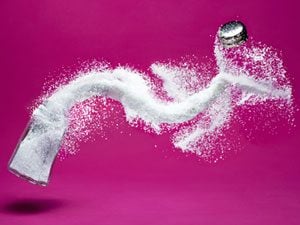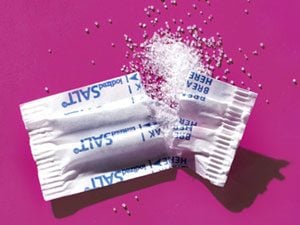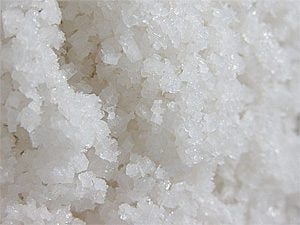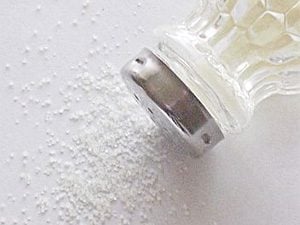Salt, Healthy? Why It Might No Longer Be Public Enemy No. 1
Updated: Apr. 06, 2020
For decades, we've been told to eat less salt for lower blood pressure—but could this advice be harming, rather than helping, our health?
 The first time I questioned the conventional wisdom on the nature of a healthy diet, I was in my salad days, almost 40 years ago, and the subject was salt. Researchers claimed that salt supplementation was unnecessary after strenuous exercise, and this advice was passed on by health reporters. I recalled high school football practices in suburban Maryland, sweating profusely through double sessions on swamplike 90-degree days. Without salt pills, I couldn’t make it through a two-hour practice; I couldn’t walk across the parking lot afterward without cramping.
The first time I questioned the conventional wisdom on the nature of a healthy diet, I was in my salad days, almost 40 years ago, and the subject was salt. Researchers claimed that salt supplementation was unnecessary after strenuous exercise, and this advice was passed on by health reporters. I recalled high school football practices in suburban Maryland, sweating profusely through double sessions on swamplike 90-degree days. Without salt pills, I couldn’t make it through a two-hour practice; I couldn’t walk across the parking lot afterward without cramping.
While sports nutritionists have since come around to recommend that we should replenish salt when we sweat it out in physical activity, the message that we should avoid salt at all other times remains strong. Experts say salt raises blood pressure, causes hypertension, and increases the risk of premature death. This is why the Department of Agriculture’s dietary guidelines still consider salt Public Enemy No. 1, before fats, sugar, and alcohol. It’s why the director of the Centers for Disease Control and Prevention has suggested that reducing salt consumption is as critical to long-term health as quitting cigarettes. And yet, this eat-less-salt argument is surprisingly controversial—because the actual evidence to support it has always been so weak.
 When I spent the better part of a year researching the state of the salt science back in 1998—already a quarter century into the eat-less-salt recommendations—journal editors and public health administrators were remarkably candid about how flimsy the evidence was implicating salt as the cause of hypertension.
When I spent the better part of a year researching the state of the salt science back in 1998—already a quarter century into the eat-less-salt recommendations—journal editors and public health administrators were remarkably candid about how flimsy the evidence was implicating salt as the cause of hypertension.
In fact, an editor for the Journal of the American Medical Association told me at the time that the authorities pushing the eat-less-salt message had made a commitment to salt education that goes way beyond the scientific facts.
While, back then, the evidence merely failed to demonstrate that salt was harmful, the evidence from studies published over the past two years actually suggests that restricting salt can increase our likelihood of dying prematurely. Put simply, the possibility has been raised that if we were to eat as little salt as the USDA and CDC recommend, we’d harm rather than help ourselves.
A Hypothesis Yet to Be Proved
Why have we been told that salt is so deadly? The advice has always sounded reasonable: Eat more salt, and your body retains water to maintain a stable concentration of sodium in your blood. This is why salty food tends to make us thirsty: We drink more; we retain water. The result can be a temporary increase in blood pressure, which will persist until our kidneys eliminate both salt and water.
The scientific question is whether this temporary phenomenon translates to chronic problems: If we eat too much salt for years, does it raise our blood pressure, cause hypertension, then strokes, and then kill us prematurely? It makes sense, but it’s only a hypothesis. The reason scientists do experiments is to find out if hypotheses are true.
In 1972, when the National Institutes of Health introduced the National High Blood Pressure Education Program to help prevent hypertension, no meaningful experiments had yet been done. The best research on the connection between salt and hypertension came from two pieces of evidence. One was the repeated observation that populations that ate little salt had virtually no hypertension. But they didn’t eat a lot of things—sugar, for instance—and any one of those could have been the causal factor. The second was a strain of “salt-sensitive” rats that reliably developed hypertension on a high-salt diet. The catch was that “high salt” to these rats was 50 times more than what the average American consumes.
Still, the program was founded to help prevent hypertension, and prevention programs require preventive measures to recommend. Eating less salt seemed to be the best option at the time, short of losing weight. Although researchers quietly acknowledged that the data were “inconclusive and contradictory” or “inconsistent and contradictory”—two quotes from cardiologist Jeremiah Stamler, MD, a leading proponent of the eat-less-salt campaign, in 1967 and 1983—publicly, the link between salt and blood pressure was upgraded from hypothesis to fact.
In the years since, the NIH has spent enormous sums on studies to test the hypothesis, and those have singularly failed to make the evidence more conclusive. Instead, organizations advocating salt restriction today—the USDA, the Institute of Medicine, the CDC, and the NIH—all essentially rely on the results from one 30-day trial: the 2001 DASH-Sodium study. It suggested that eating significantly less salt would modestly lower blood pressure; it said nothing about whether this would prevent heart disease or lengthen life.
 The Problem with Too Little Salt
The Problem with Too Little Salt
The idea that eating less salt can worsen health outcomes may sound bizarre, but it’s not new. A 1972 paper published in the New England Journal of Medicine reported that the less salt people ate, the higher their levels of renin, a substance secreted by the kidneys, which set off a physiological cascade of events that seemed to end with an increased risk of heart disease. In this scenario: Eat less salt, secrete more renin, get heart disease, and then die prematurely.
Four years ago, Italian researchers began publishing the results from a series of clinical trials, all of which reported that, among patients with heart failure, reducing salt consumption increased the risk of dying prematurely. Other recent studies suggest that reducing sodium to anything like what government policy refers to as a “safe upper limit” (one teaspoon a day if you’re healthy) is likely to do more harm than good. These studies, which covered some 100,000 people in more than 30 countries, showed that salt consumption is remarkably consistent—about one and a half teaspoons a day—among populations over time. This suggests that how much salt we eat is determined by physiological demands, not diet choices. And a handful of these studies—involving type 1 diabetics, type 2 diabetics, healthy Europeans, and patients with chronic heart failure—reported that the people eating salt at the lower limit of normal were more likely to have heart disease than those eating smack in the middle of the normal range. Effectively what the 1972 paper on the salt-renin connection would have predicted.
Proponents of the eat-less-salt campaign tend to deal with this contradictory evidence by implying that anyone raising it is a shill for the food industry (which has been widely criticized for adding salt to processed foods to improve taste) and doesn’t care about saving lives. An NIH administrator told me back in 1998 that to publicly question the science on salt was to play into the hands of the food industry.
When several agencies, including the Department of Agriculture and the Food and Drug Administration, held a hearing last November to discuss how to go about getting Americans to eat less salt (as opposed to whether or not we should eat less salt), these anti-salt proponents argued that the latest reports suggesting damage from lower-salt diets should simply be ignored. According to cardiologist Graham MacGregor, MD, who has been promoting low-salt diets since the 1980s, the studies were no more than “a minor irritation that causes us a bit of aggravation.”
This attitude that studies that go against prevailing beliefs should be ignored on the basis that, well, they go against prevailing beliefs, has been the norm for the anti-salt campaign for decades. Maybe now the prevailing beliefs should be changed.
Next: Who’s right? The other side of the salt shaker.
 Editor’s Note: It’s hardly surprising that this article came under fire from the public health community after it was published. Salt has become a controversial topic as more conflicting research questions whether too much, or too little, is harmful. Critics point to flaws in some of the research this article cites, including studies that are too short-term, that over-rely on one-day measures of sodium excretion as a meaningful measure of salt intake, and that draw conclusions for the population as a whole from studies of people with specific health conditions. In November, the American Heart Association released a new analysis supporting its recommendation that all Americans reduce their salt intake.
Editor’s Note: It’s hardly surprising that this article came under fire from the public health community after it was published. Salt has become a controversial topic as more conflicting research questions whether too much, or too little, is harmful. Critics point to flaws in some of the research this article cites, including studies that are too short-term, that over-rely on one-day measures of sodium excretion as a meaningful measure of salt intake, and that draw conclusions for the population as a whole from studies of people with specific health conditions. In November, the American Heart Association released a new analysis supporting its recommendation that all Americans reduce their salt intake.
But as Michael Alderman, MD, editor of the American Journal of Hypertension, told the New York Times last May, one of the problems with the salt debate is that “all the studies are inadequate.” The kind of research that could provide an answer once and for all—a large study in which people are randomly assigned to a low-sodium diet or not and then followed for years to measure health outcomes—may never happen, due to the expense, as well as logistical and ethical challenges.
Reader’s Digest looks for the most thought-provoking health reads in the land. Gary Taubes, a science writer who has famously challenged conventional weight-loss wisdom, now raises important questions about how health public policy regarding salt was established. As the debate evolves, William B. White, MD, president of the American Society of Hypertension, offers this guideline: Salt intake is likely not a concern for healthy people. “But for those with high blood pressure, heart disease, or kidney disease, there’s enough evidence to show that too much salt is toxic,” he says. If you’re concerned about how much salt you should be eating, don’t make any major changes without first talking to your doctor.—Lauren Gelman